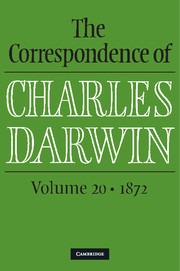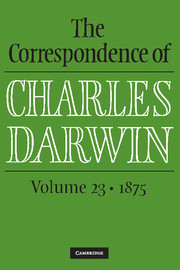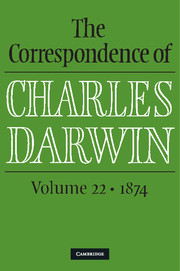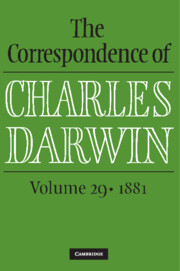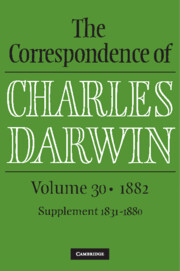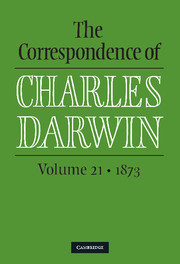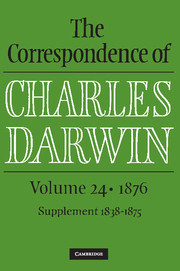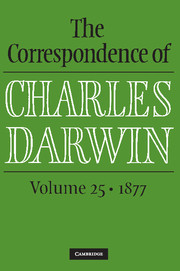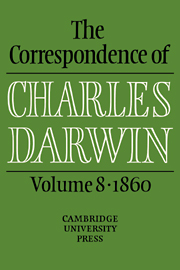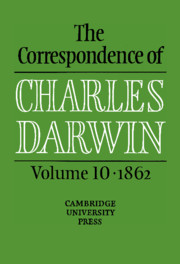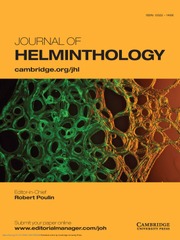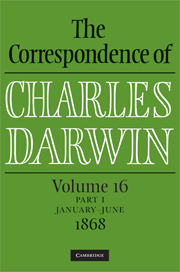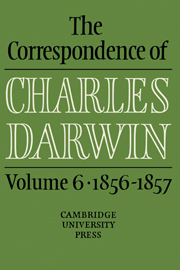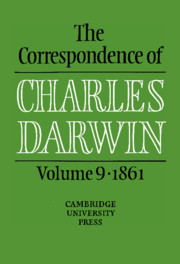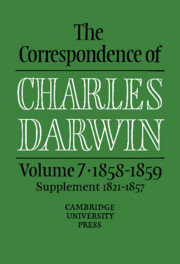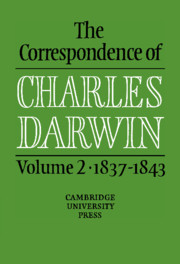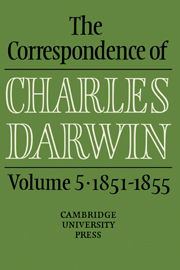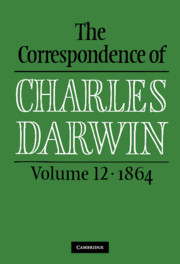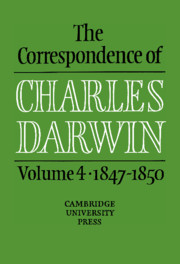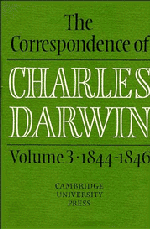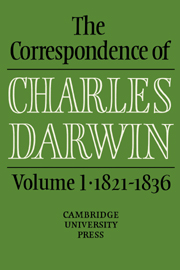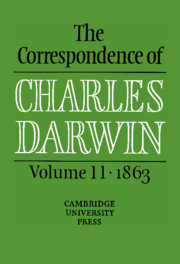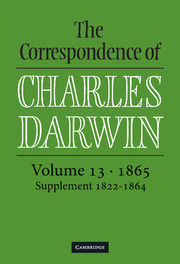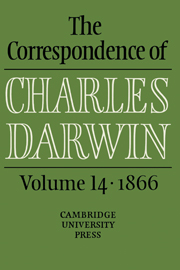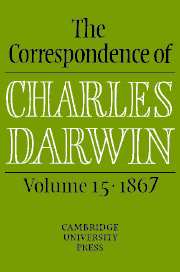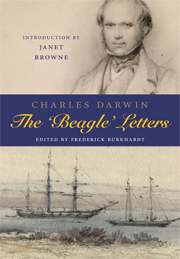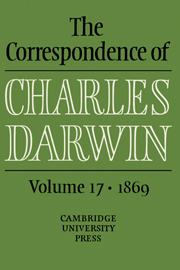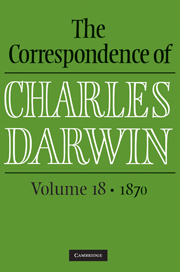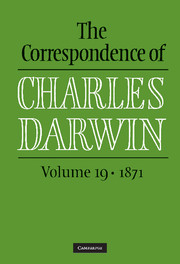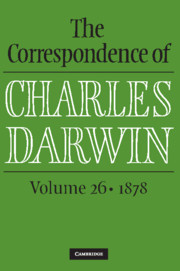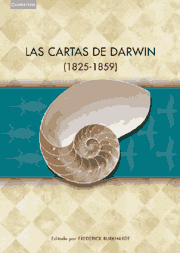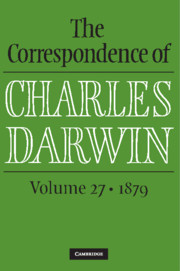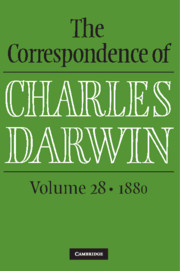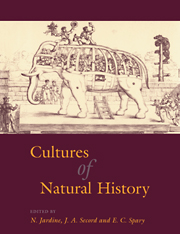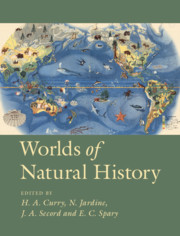The Correspondence of Charles Darwin
Volume 20. 1872
Part of The Correspondence of Charles Darwin
- Real Author: Charles Darwin
- Editors:
- Frederick Burkhardt, American Council of Learned Societies
- James Secord, University of Cambridge
- The Editors of the Darwin Correspondence Project, University of Cambridge
- Date Published: July 2013
- availability: Available
- format: Hardback
- isbn: 9781107038448
Hardback
Other available formats:
eBook
Looking for an examination copy?
This title is not currently available for examination. However, if you are interested in the title for your course we can consider offering an examination copy. To register your interest please contact [email protected] providing details of the course you are teaching.
-
This volume is part of the definitive edition of letters written by and to Charles Darwin, the most celebrated naturalist of the nineteenth century. Notes and appendixes put these fascinating and wide-ranging letters in context, making the letters accessible to both scholars and general readers. Darwin depended on correspondence to collect data from all over the world, and to discuss his emerging ideas with scientific colleagues, many of whom he never met in person. The letters are published chronologically: volume 20 includes letters from 1872, the year in which The expression of the emotions in man and animals was published, making ground-breaking use of photography. Also in this year, the sixth and final edition of On the origin of species was published, and Darwin resumed his work on carnivorous plants and plant movement, finding unexpected similarities between the plant and animal kingdoms.
Read more- Complete transcriptions of more than 600 letters written and received by Charles Darwin in 1872, providing for the first time primary materials of immense value to researchers across a range of disciplines
- Includes clear and concise explanatory notes, making the material accessible to both scholars and general readers
- The narrative introduction provides a compact but highly readable account of Darwin's life in 1872, a highly significant year both professionally and in his private life, and a biographical register provides brief notes on people mentioned in the letters
Reviews & endorsements
Review of volumes 19 and 20:
"The editing and organization of these volumes is, as always, superb; the Darwin Correspondence really does set the standard against which all comparable projects have to be measured. In addition to a wonderfully erudite editorial apparatus (the footnotes alone contain a wealth of invaluable information), all the surviving letters Darwin received are published … as well as by dates, topics and so on … the importance and usefulness of these volumes go well beyond the world of Darwin, or even studies of the many forms of nineteenth-century evolutionism. No Victorianist should be without them."
Jim Endersby, British Journal for the History of ScienceSee more reviews'This volume is packed with interesting information. How much I look forward to the volumes that take us through the next ten years, to the end in 1882. I used to think, forty years ago, when I and other Darwin scholars were rampaging through the vast holdings in the University Library at Cambridge, that we would have used up all of the good material and left little for the next generation. Now I see how wrong I was. We have a good basic idea of Darwin the man and scientist. How much there is still to learn about the influences and implications. Rightly, the Darwin correspondence will give work for years to come.' Michael Ruse, The Quarterly Review of Biology
Review of volumes 19 and 20: 'The editing and organization of these volumes is, as always, superb; the Darwin Correspondence really does set the standard against which all comparable projects have to be measured. In addition to a wonderfully erudite editorial apparatus (the footnotes alone contain a wealth of invaluable information), all the surviving letters Darwin received are published … as well as by dates, topics and so on … the importance and usefulness of these volumes go well beyond the world of Darwin, or even studies of the many forms of nineteenth-century evolutionism. No Victorianist should be without them.' Jim Endersby, British Journal for the History of Science
Review of volumes 20 and 21: 'Each volume contains an introduction, a chronology, a bibliography, a biographical register, and a wealth of footnotes, all of which help the reader to navigate the text. There is also a variety of supplementary material, including well-chosen illustrations.' Michael Ghiselin, Isis
Customer reviews
Not yet reviewed
Be the first to review
Review was not posted due to profanity
×Product details
- Date Published: July 2013
- format: Hardback
- isbn: 9781107038448
- length: 904 pages
- dimensions: 240 x 165 x 50 mm
- weight: 1.48kg
- contains: 56 b/w illus.
- availability: Available
Table of Contents
List of illustrations
List of letters
Introduction
Acknowledgments
List of provenances
Note on editorial policy
Darwin/Wedgwood genealogy
Abbreviations and symbols
The Correspondence
Expression supplement
Appendixes: I. Translations
II. Chronology
III. Diplomas presented to Charles Darwin
IV. Presentation lists for Origin 6th ed.
V. Presentation lists for Expression
Manuscript alterations and comments
Biographical register and index to correspondents
Bibliography
Notes on manuscript sources
Index.
Sorry, this resource is locked
Please register or sign in to request access. If you are having problems accessing these resources please email [email protected]
Register Sign in» Proceed
You are now leaving the Cambridge University Press website. Your eBook purchase and download will be completed by our partner www.ebooks.com. Please see the permission section of the www.ebooks.com catalogue page for details of the print & copy limits on our eBooks.
Continue ×Are you sure you want to delete your account?
This cannot be undone.
Thank you for your feedback which will help us improve our service.
If you requested a response, we will make sure to get back to you shortly.
×
